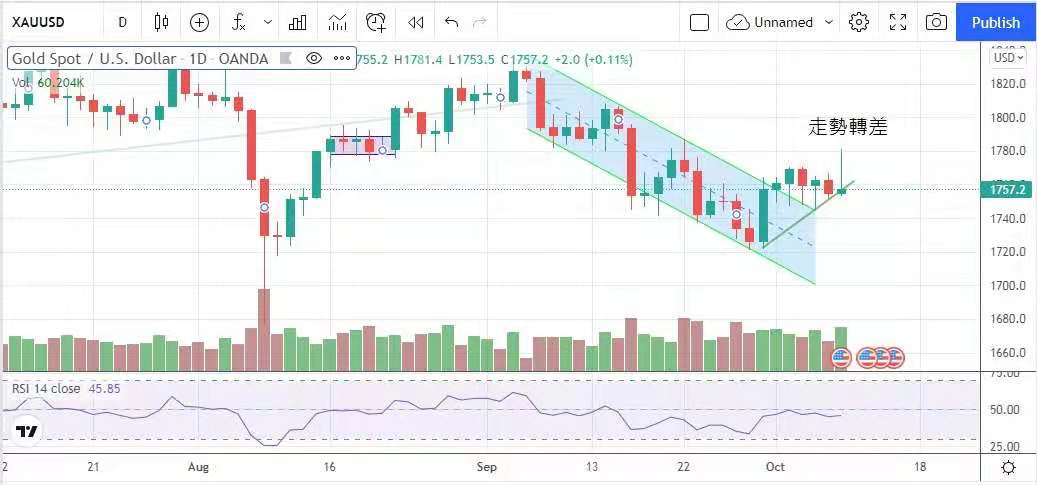Extremely difficult to touch.
On October 11th.
Today's volatility range:
The two largest economies in the world are in debt crisis, which can be said to be a side effect of unlimited quantitative easing. It is necessary for the Federal Reserve to withdraw from the market. However, the employment data of the United States is repeated month after month, which is extremely difficult to touch.
Whether the Fed's delisting plan changes has become another focus of the market. Under the lack of direction, the gold market will continue to fluctuate this week. Today's suggested volatility is between $1742 and $1764.
Mainland real estate debt defaults have exploded again. In addition, the Ministry of Industry and Information Technology has to supervise the algorithm of Internet information services, and technology stocks have fallen sharply. Last Monday, the Hong Kong stock market was shaken. At most, mainland real estate debt defaults have exploded again.
After falling below 24,000 points, the Hang Seng Index finally fell by 540 points, a drop of 2.19%. Although it can close above 24,000 points, it is still crumbling! With the release of the last Policy Address of the current administration on Wednesday,
The theme focused on the "Northern Metropolitan Area" project, which boosted Hong Kong's good infrastructure stocks and Hong Kong's real estate stocks. The market also sought after the banking stocks that were financed and invested. Although some foreign investors played down China's economic prospects, they won gold in China.
At the end of the holiday, Beishui resumed to support Hong Kong stocks in the south. The Hang Seng Index opened 372 points higher on Thursday and rose more and more for two consecutive days. Last week, it closed up 262 points or 1.07% to close at 24,837 points.
In Europe, the rise in energy prices and supply bottlenecks have led to the intensification of the euro zone's economy. The market is worried that the rise in economy will increase the operating costs of enterprises, but the job market is still poor, and all the increase cannot be passed on to consumers.
Ultimately affecting profits, venture capitalists reduced their holdings of European stocks, and the three major European stock markets fell for three consecutive days at the beginning of the week. By Thursday, some members of the management Committee of the European Central Bank pointed out that the European Central Bank planned to withdraw from responding to the COVID-19 outbreak.
During the emergency rescue plan, investors should not expect the central bank to raise interest rates too early. The news stimulated investors to chase the risky market step by step, and the three major European stock markets retaliated greatly, completely losing ground at the beginning of the week, and the whole line rose by more than 1%.
In a week, Germany's DAX index rose by 0.33%; The CAC index in Paris, France rose by 0.65%; The FTSE 100 Index rose 0.97%.
On Monday, the US stock market fell due to the impact of debt default. The market is worried not only about mainland enterprises, but also about the United States itself. U.S. President Biden said that Congress failed to raise or freeze the debt ceiling within two weeks.
There may be a debt default in the United States. The yield of 10-year U.S. Treasury bonds has dropped by 1.5%, and the three major indexes of U.S. stocks have dropped by more than 1% to 2%. On Tuesday, the purchasing managers' index of non-manufacturing industries in the United States performed better than market expectations.
The three major indexes on Wall Street began to rebound. Moody's, a rating agency, expected that the US Congress would pass the debt ceiling bill, maintaining the AAA rating of US Treasury bonds and the US Senate reached a short-term debt ceiling agreement on Thursday.
Coupled with the easing of tension between China and the United States, U.S. stocks rose for three consecutive days, until Friday, when non-agricultural data hit a low level since December last year, and U.S. stocks retreated. In the summary week, the Dow Jones index rose by 0.98%, the biggest weekly increase since June.
The S&P 500 index rose 0.82%; Nasdaq index rose 1.05%.
Mainland real estate debt defaults have exploded again, and China's economy is in danger at all levels. However, US President Biden warned that the United States may default on its debt, and the two largest economies in the world are in debt crisis, which is affected by safe-haven demand.
The gold market rose by up to US$ 20 on Monday, but the market waited for Friday's non-agricultural data. The performance of the gold market was uneven, and the daily rise and fall were limited to US$ 10. Until Friday, the US non-agricultural data was released, and the number only increased by 194,000.
Employment, the smallest increase since December last year, was far lower than expected. The price of gold was immediately boosted by poor data, and the highest price of gold was $1,781. However, the unemployment rate in the United States announced later unexpectedly dropped more than expected.
The lowest price of gold was $1,753, and it closed at $1,757, rising by $2 on Friday and falling by $3.7 in a week.
For detailed analysis and operational suggestions, please CLICK the following link to join the group and check with the administrator.
https://t.me/mingtakchat
Previous Article Next Article


 Whatsapp
Whatsapp Telegram
Telegram

